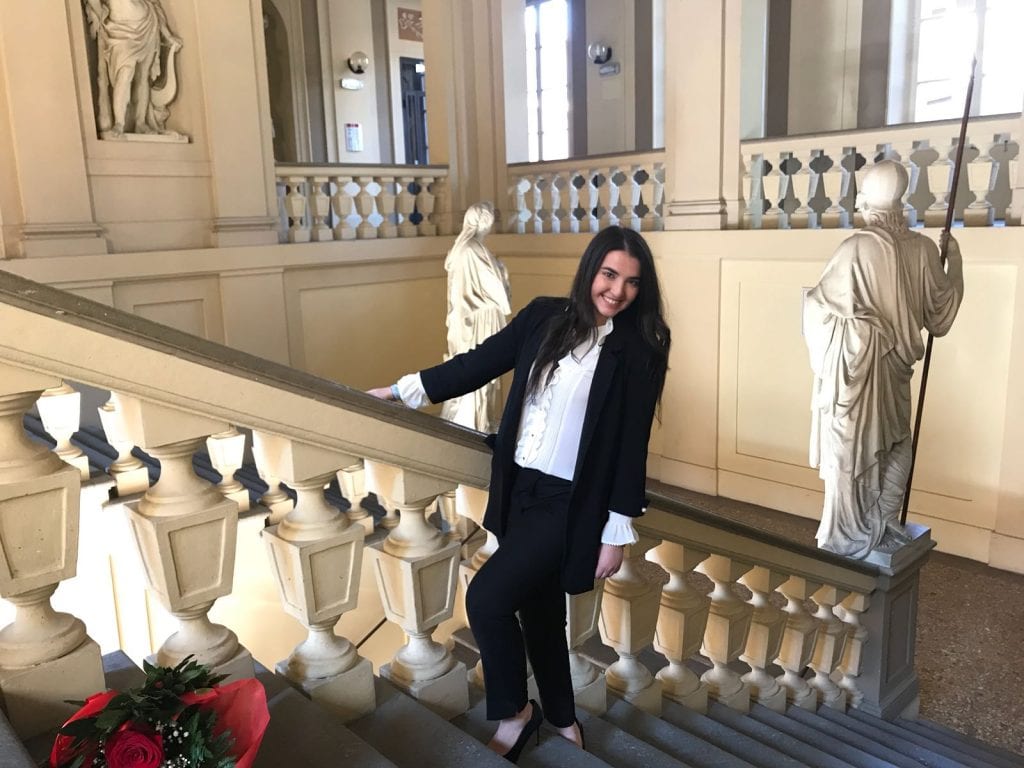From Italy to UCF, Student Finds Success

Helin Yıldız traveled from Italy after being accepted by the Kurdish Political Studies Program to continue her master’s education abroad. During her time in Orlando, Yıldız attended courses at UCF, interacted with professors and students about her research and intellectual interests, participated in KPSP events and made trips to Washington, D.C. to conduct interviews. Yıldız completed her master’s thesis while in Orlando, and graduated with honors when she returned to Italy. We talked to Yıldız about her experiences with KPSP.
How did you hear about the Kurdish Political Studies Program at UCF? How did you end up coming here?
I’ve always had a particular interest in the Kurdish program. I already knew about Dr. Güneş Murat Tezcür, and learned about the KPSP after searching on the web for academic research centers on Kurdish affairs. My home university – the University of Bologna in Italy – offers graduate students a study abroad grant for research for their final thesis project. When the study grant announcement was published in May 2017, I had already decided on my thesis topic and structure with my advisor and needed to find the research center that would host me. As soon as I got accepted to the KPSP, I won the scholarship.
What opportunities and resources did you find most useful at KPSP?
First of all, Dr. Tezcür’s availability as my academic advisor during this period was the factor that actually encouraged me to apply for KPSP. His academic expertise, advice and the original datasets he collected over the years helped me with my research. Next, I had full access to resources at UCF library, and obtained books and articles via the Interlibrary Loan & Document Delivery Services. Additionally, the KPSP organizes panel discussions with guests specifically focused on Kurds, which I consider very valuable for students who want to better understand the recent developments in the region. Finally, I personally interviewed experts, journalists and political representatives in Washington D.C and incorporated their perspectives into my thesis.
Could you briefly talk about your MA thesis you finished while being at KPSP? What is your most important finding regarding Kurdish governance in Syria?
My MA thesis is about the rise of Rojava, the de facto Kurdish autonomous region in northern Syria during late 2013. My thesis has three interrelated but distinct focuses. First, my research analyzes the characteristics of political governance in Rojava and identifies the strength and weaknesses of the new social and political model put into practice in northern Syria. The Rojava model has fostered a number of positive developments such as gains made in terms of gender equality and interethnic and religious alliances. However, Rojava’s long-term survival faces a number of serious challenges, such as the durability of the Kurdish-Arab relationship. Next, my research shows how the rise of Rojava deeply affected Turkish domestic politics, such as ending the peace process between the Turkish state and the Kurdish insurgent PKK in 2015. Finally, it offers a comparative perspective between Rojava and the Kurdistan Regional Government of Iraq by revealing their significant differences.
How do you think your career benefits from your stay as a visiting graduate student at KPSP?
I think it is very important to have a study abroad experience that leads to immersion into distinct academic and social environments. My stay at UCF as a visiting graduate student was my third academic experience abroad, after the Erasmus programs with Boğaziçi University in Istanbul and the Katholieke University in Leuven, Belgium. My UCF experience was different from the previous ones, as I pursued an autonomous research agenda. I gained access to different perspectives and learned how to conduct research in a more objective way. Also, as I had the opportunity to attend both Dr. Tezcur’s Ph.D. class on advanced qualitative methods and his undergraduate class on Kurdish politics, I was able to compare the American academic system with the Italian one. I could say that the American system is much more interactive. It also gives more weight to the employment of quantitative methods and tools rather than qualitative ones. This was something I was not familiar with before.
Is there a memorable moment related to your stay here? Would you like to share it with us?
In late October I took part in the ISA South Annual Conference 2017, where I presented my thesis project on a panel. I remember feeling anxious the days before the conference because it would be my first time presenting in an academic panel discussion. However, everything went well. The experience was stimulating and I enjoyed it very much.
